
The dusky warbler is a leaf warbler which breeds in the east Palearctic. The genus name Phylloscopus is from Ancient Greek phullon, "leaf", and skopos, "seeker". The specific fuscatus is from Latin fuscus "dark".

The dusky thrush is a member of the thrush family which breeds eastwards from central Siberia to Kamchatka wintering to Japan, South China and Myanmar. It is closely related to the more southerly breeding Naumann's thrush T. naumanni; the two have often been regarded as conspecific. The scientific name comes from Latin Turdus, "thrush" and Ancient Greek eunomos, "orderly".

The dusky-capped flycatcher is a passerine bird in the tyrant flycatcher family. It breeds in forest and other woodland from southern Arizona, as well as the Chisos Mountains, Texas, south to northern Argentina and on Trinidad. It is resident in most of its range, but American breeders retreat to Mexico in winter.

The common chlorospingus, also referred to as common bush tanager, is a small passerine bird. It is a resident breeder in the highlands from central Mexico south to Bolivia and northwest Argentina. C. flavopectus in the loose sense is a notorious cryptic species complex, and several of the up to 25 subspecies recognized in recent times are likely to be distinct species. Some populations in fact appear to be more distinct than several other members of Chlorospingus.

The sooty-capped chlorospingus or sooty-capped bush tanager is a small passerine bird traditionally placed in the family Thraupidae, but now viewed closer to Arremonops in the Passerellidae. This bird is an endemic resident breeder in the highlands of Costa Rica and western Panama.

The dusky megapode, also known as dusky scrubfowl or common megapode, is a medium-sized, approximately 41 cm long, blackish bird with a short pointed crest, bare red facial skin, dark legs, brown irises, and a dark brown and yellow bill. The male and female are similar. This terrestrial species lives in forests and swamps, including mangroves, of the Maluku and Raja Ampat Islands in Indonesia. Like other megapodes, it lays its eggs in a mound made from earth mixed with leaves, sand, gravel, and sticks, which can be as large as 11 m (36 ft) in diameter and stand nearly 5 m (16 ft) tall.

The dusky woodswallow is a bird species of forests and woodlands in temperate and subtropical regions, extending into tropical areas around the Atherton Tableland, in eastern and southern Australia. The global population of the species has as yet not been formally confirmed, but it has been officially rated in the range of 'Least Concern', according to the BirdLife International in 2004. As such, the bird could be described as common in its local habitat.
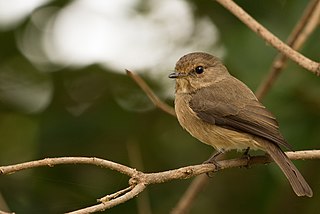
The African dusky flycatcher, also known as the dusky-brown flycatcher or dusky alseonax, is a small passerine bird of the Old World flycatcher family, Muscicapidae. It is a resident breeder in Africa from Nigeria, the Central African Republic, South Sudan and Ethiopia south to South Africa. It is very common in its woodland habitat, which includes riverine forests, evergreen forest edges and clearings, especially near water bodies such as lakes, dams and streams, and well-wooded suburban gardens.
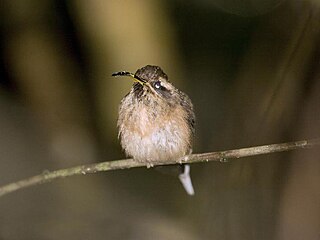
The dusky-throated hermit is a species of hummingbird in the family Trochilidae. It is endemic to Brazil.

The dusky-billed parrotlet, also known as Sclater's parrotlet, is a small species of parrot in the family Psittacidae. It is the nominate species.

The dusky eagle-owl is an owl species in the family Strigidae that is widespread in South and Southeast Asia. The type specimen used to describe the species was collected on the Coromandel Coast, which was used for the specific epithet. It is listed as Least Concern on the IUCN Red List. The species's extent of occurrence is estimated at 9,250,000 km2 (3,570,000 sq mi). However, volunteer generated databases such as eBird.org suggest that the available extent of occurrence is a vast over-estimate.
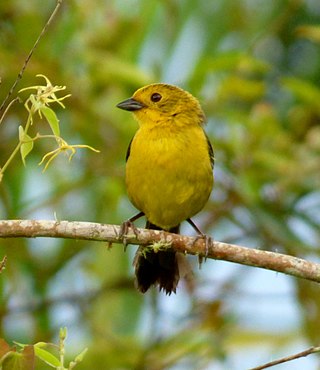
The yellow-headed brushfinch is a Near Threatened species of bird in the American sparrow family, Passerellidae. It is endemic to Colombia. The common name is a semi-literal translation of the scientific name, with Atlapetes referring to the brushfinch genus, and flaviceps meaning "yellow-headed".

Chlorospingus is a genus of perching birds, the bush tanagers, traditionally placed in the tanager family (Thraupidae). More recent studies which suggest they are closely related to the genus Arremonops in the Passerellidae. As of July, 2017, the American Ornithological Society assigns the genus to the new family Passerellidae, which contains the New World sparrows.
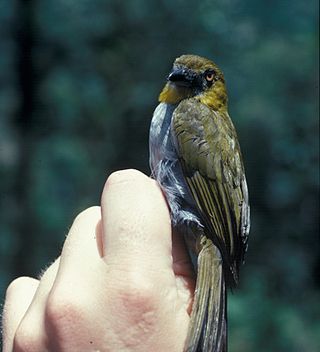
The yellow-throated chlorospingus or yellow-throated bush tanageris a species of bird traditionally placed in the family Thraupidae, but now closer to Arremonops in the Passerellidae. It is found in Bolivia, Colombia, Ecuador, Panama, and Peru.

The yellow-green tanager is a species of bird in the family Thraupidae. It was formerly known as the yellow-green bush tanager or yellow-green chlorospingus as it used to be placed in the genus Chlorospingus with other bush tanagers. Chlorospingus as a whole was formerly placed in the tanager family Thraupidae, but was transferred to the New World sparrows when genetic analysis of two Chlorospingus species revealed they were embedded within the latter family. However, more recently, molecular analysis of additional Chlorospingus species found that the yellow-green tanager is not a member of Chlorospingus but a true tanager after all, most closely related to the blue-and-gold tanager, so the species was returned to Thraupidae and placed in the genus Bangsia.

The Pirre chlorospingus or Pirre bush tanager is a species of bird traditionally placed in the family Thraupidae, but now viewed closer to Arremonops in the Passerellidae. It is endemic to Panama. Its natural habitat is subtropical or tropical moist montane forests.
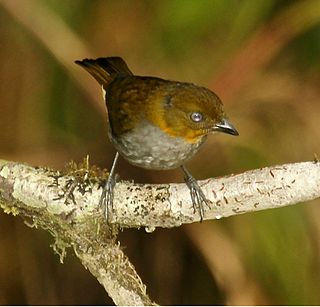
The yellow-whiskered chlorospingus, yellow-whiskered bush tanager or short-billed bush-tanager is a species of bird traditionally placed in the family Thraupidae, but now viewed closer to Arremonops in the Passerellidae. It is found in Bolivia, Colombia, Ecuador, and Peru.

The Tacarcuna chlorospingus or Tacarcuna bush tanager is a species of bird traditionally placed in the family Thraupidae, but now viewed closer to Arremonops in the Passerellidae.
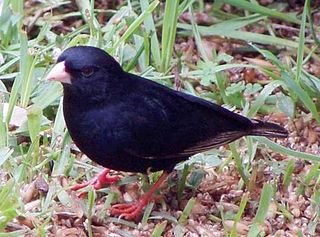
The dusky indigobird, variable indigobird, or black widowfinch is a species of bird in the family Viduidae. It is found in Angola, Burundi, Cameroon, Republic of the Congo, Democratic Republic of the Congo, Eswatini, Guinea-Bissau, Malawi, Mozambique, Nigeria, Sierra Leone, South Africa, Tanzania, Zambia, and Zimbabwe. Its natural habitat is moist savanna.
The New Guinea woodcock is a species of bird in the family Scolopacidae formerly considered to be conspecific with the Javan woodcock and called collectively the dusky woodcock. It is native to the New Guinea Highlands.





















